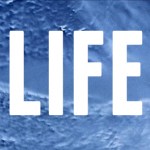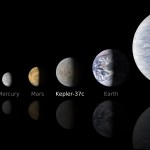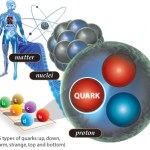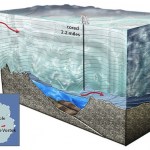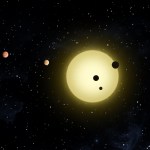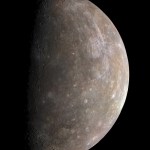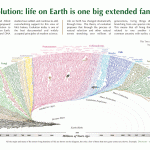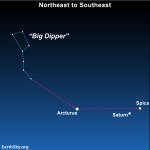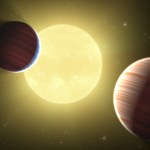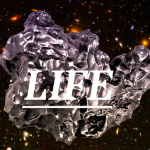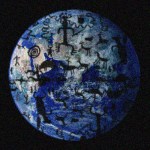life
[NOTE: As I mentioned yesterday, our power outage continues, and, thanks to having to decamp to a hotel last night, I didn't have time to produce new Insolence. So I thought I'd repost a "classic" from 11 years ago that I don't believe I've ever reposted before during vacation or otherwise. It represents a sort of blogging that I haven't done for years, just a personal story with nothing to do with my usual topics, such as pseudoscience, quackery, clinical trials, and basic science. This story is based on a real patient encounter from around 25 years ago, but details have been changed.]
I don…
Ever wonder what lies beneath the polar ice? Turns out several researchers did as well. This past July a team of scientists led an expedition designed to image life under sea ice. The video below was captured with the Nereid Under Ice (NUI) vehicle and shows brown algae living on the bottom of sea ice as well as larvaceans, which are filter-feeding tunicates. The advantage of the new vehicle is that it can travel very far (the spools of cable are ~40 km long) and allows researchers to create maps and collect samples. Researchers are hoping to explore greater distances in future dives that…
"Education is an admirable thing, but it is well to remember from time to time that nothing worth knowing can be taught." -Oscar Wilde
As many of you know, last weekend I launched a suggestion box here on the site, and I've been overwhelmed by the response: about fifty of you have sent something in to me in the first less-than-a-week of this alone!
Image credit: Thao Nelson of http://mycredo.wordpress.com/.
So, let's start answering them! There are more than enough excellent questions and suggestions to keep me busy for a long time, but with the new academic year starting up, one of…
Discovery, by nature, has a ripple effect. When one thing is found to be plausible, testable, or true, a suite of potential other truths and plausibilities tend to follow suit. This is the nature of inductive reasoning, the foundation of the scientific method, and the reason why science–as a human project–is generational. We discover something unexpected, and we celebrate twofold, threefold, and morefold, because its nuances and implications can ebb outwards, often lending hope to scientists working in entirely different fields.
Take the recent discovery of life in Lake Vostok, for instance:…
"You can spend too much time wondering which of identical twins is the more alike." -Robert Brault
You've of course heard by now the news that Kepler, the most successful and prolific planet-finding mission of all time, has probably reached the end of its useful lifespan.
Image credit: NASA / Kepler Mission / Wendy Stenzel.
With nearly 3,000 planet candidates under its belt, including many approximately Earth-sized (and some even smaller), and many within their parent star's habitable zone, we now know that, at least planet-wise, we're not alone in our galaxy.
Image credit: NASA Ames /…
The final session in the online discussion of the NASA Astrobiology Roadmap is today from 4-5 pm eastern.
Go to Astrobiology Future to sign in to the live web chat. Questions and comments will be taken both from call-ins and from written questions.
The online discussion will be moderated by Dr Francis McCubbin from UNM, Dr Sean Raymond from Laboratoire d'Astrophysique de Bordeaux, and yours truly...
The live session will, as with the other Roadmap sessions, be followed by a week long opportunity to input questions, ideas and topics for discussion at The Astrobiology Future Forum.
The four…
"The atoms come into my brain, dance a dance, and then go out - there are always new atoms, but always doing the same dance, remembering what the dance was yesterday." -Richard Feynman
Here you are, a human being, a grand Universe of atoms that have organized themselves into simple monomers, assembled together into giant macromolecules, which in turn comprise the organelles that make up your cells. And here you are, a collection of around 75 trillion specialized cells, organized in such a way as to make up you.
Image credit: J. Roche at Ohio University.
But at your core, you are still just…
Lake Vostok (cross-section) prior to completion of drilling. Credit: National Science Foundation
Okay, this may not have anything to do with animal physiology...but then again maybe it does...
Russian scientists have just retrieved a core sample of frozen ice from the subsurface Lake Vostok in Antarctica that has been isolated from the outside world for at least 100,000 if not millions of years. The lake was protected by 4,000 meters of ice. The scientists drilled a hole that reached the surface of the lake and allowed the pressure from the lake to raise the water into the hole, where it…
More Phenomenal random links to random stuff: life, the Universe and Everything
Phenomena - new blog group under National Geographic, including some long time scibloggers: The Loom, Not Exactly Rocket Science, Laelaps and Only Human, to begin with.
On the Usefulness of Useless Knowledge - Bee explains.
Substantive Advice to Admissions Committees - Or, why, all things being equal, we should prefer candidates from less prestigious institutions.
This is actually sensible - it is a "what have you done with what you were given" argument.
But, all things are very rarely equal... and no one ever…
"Death comes to all, but great achievements build a monument which shall endure until the sun grows cold." -Ralph Waldo Emerson
In the great cosmic ocean, there's only one planet that we know -- for certain -- has the right conditions and history to result in intelligent life: our own.
Image credit: NASA, from the Space Shuttle, for Sun-Earth Day 2008.
Life -- or even intelligent life -- may be possible in environments vastly different than our own: around different classes of stars, at different temperatures, and even with different molecules and/or chemical elements.
But we know…
"You don't drown by falling in the water; you drown by staying there." -Edwin Louis Cole
Our Solar System is -- at least from our perspective -- the most well-studied system of planets, moons, asteroids and comets in the entire Universe.
Image credit: Olaf Frohn, from earlier in 2012.
And in this system, the closest planet to our Sun, Mercury, was also one of the most poorly understood planets until very recently. Because Mercury is so close to the Sun, it's very difficult to view it under good conditions with a telescope; the risk of ruining your optics by exposing them to direct…
“We live in an atmosphere of shame. We are ashamed of everything that is real about us; ashamed of ourselves, of our relatives, of our incomes, of our accents, of our opinions, of our experience, just as we are ashamed of our naked skins.” -George Bernard Shaw
All that is real about ourselves is nothing to be ashamed about; quite to the contrary, it's something to be eminently thankful for. This very existence is all we have, and while it's minuscule compared to the entire Universe, it required the entire Universe to bring us to the point where it's possible for us to exist.
What do…
"The important point is that since the origin of life belongs in the category of at least once phenomena, time is on its side. However improbable we regard this event, or any of the steps which it involves, given enough time it will almost certainly happen at-least-once. And for life as we know it, with its capacity for growth and reproduction, once may be enough." -George Wald
That there's an amazing story of life's evolution on Earth is a scientific certainty. The evidence is encoded in the nucleic acid sequences of every living organism ever discovered, and the history of life on this…
"Everyone is a moon, and has a dark side which he never shows to anybody." -Mark Twain
Back before the telescope was invented, Saturn was known as the Old Man of the Skies. The slowest-moving of the naked-eye planets, it's the only one that would reliably be in nearly the same location, year after year. You can find it all summer, after sunset, by following the "arc" of the handle of the big dipper all the way until you run into the brightest northern-hemisphere star, Arcturus, and then speeding on to the very bright Spica. Saturn is right next door.
Image credit: EarthSky.org.
But…
"Everyone must leave something behind when he dies, my grandfather said. A child or a book or a painting or a house or a wall built or a pair of shoes made. Or a garden planted. Something your hand touched some way so your soul has somewhere to go when you die, and when people look at that tree or that flower you planted, you're there." -Ray Bradbury
Today is Memorial Day here in the United States, where we honor all the soldiers who have fought and fallen for our country. The peace and prosperity that I have enjoyed my entire life is because of a price paid, many times over, mostly by people…
The Book of Exogenesis: In the beginning was the word, and the word was a meteorite...
Earlier this month, a report, based on NASA studies of meteorites found on Earth, suggested that some building blocks of DNA may have been formed in space.
As it turns out, DNA components have been found on meteorites before, but it's never been entirely clear if the space rocks came to Earth bearing these molecules, or if they were contaminated upon arrival. Furthermore, this recent study of meteorites was the first to discover trace amounts of three molecules -- purine, 2,6-diaminopurine, and 6,8-…
Let's define alien.
Definition number one: unfamiliar. By that description alone, a good 99% of life on this planet is alien. Breathing water, living nestled in thermal vents, stalking prey on the veldt, growing out of the Earth and eating sunlight, without eyes, without legs, with extra legs, color-blind, carapaced, marsupial, with exoskeletons, with jelly for brains, microbial, in a test tube, growing from spores. Not to mention the extremophiles, those nutty organisms that thrive in hellish environments like boiling acid, liquid asphalt, radioactive waste, and under extreme pressure.
I'…
What do these three quotations have in common? Hint: it lives in a petri dish.
"To live, to err, to fall, to triumph, and to recreate life out of life." -- James Joyce
"What I cannot build, I cannot understand." -- Richard Feynman
"See things not as they are, but as they might be." -- from American Prometheus, a biography of the nuclear physicist Robert Oppenheimer
Although James Joyce could never have imagined it, his words -- and those of Feynman and Oppenheimer, too -- are no longer relegated to library stacks, but instead live on inside an unlikely host: the world's first synthetic…
In 1926 German illustrator Fritz Kahn drew Der Mensch als Industriepalast, part of a series of artworks reinterpreting the body as a mechanical factory. Now fellow countryman and artist Henning Lederer has updated the the famous image, turning it into an interactive animation.
He says:
The visual crossover between industrialization and science in Fritz Kahn's artwork demonstrates surprisingly accurately how human nature became culturally encoded by placing the knowledge in an industrial modernity of machine analogues. He produced lots of illustrations that drew a direct functional analogy…
tags: The Free Hugs Campaign in Finland, Helsinki, free hugs, silly, humor, funny, offbeat, weird, life, Finland, Helsinki, streaming video
The Finnish winter is long, dark and difficult for many people. So a group of Helsinki residents started a free hugs campaign to cheer people up. A group calling themselves, "FreeHugs Finland" had been promoting for this day on the internet and over 30 huggers showed up! During a couple of hours over 1000 people in Helsinki got a hug and one woman told me it saved her day! [Music: "Lonely" by Unity]
This video was taken in Helsinki, Finland on 2 December…


